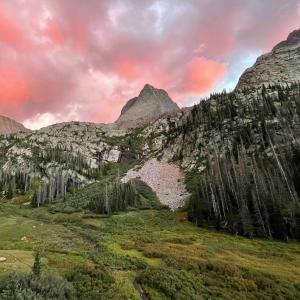The Rapid Climate Assessment Program
Date
In a world of rapid climate change, there’s a need for rapid assessment of these changes. The NC CASC’s Rapid Climate Assessment Program (RCAP) was started in the summer of 2023 to create a series of scientific syntheses referred to as Rapid Climate Assessments that can be used as a baseline for further research and a foundation for future stakeholder engagement, with possible longer-term or more in-depth projects. The RCAP projects this summer spanned a variety of topics, from climate adaptation in mountain ecosystems to resource management in the Northern Great Plains, to conserving grassland ecosystems and examining large-scale drivers of water availability in the North Central region of the United States.
Dr. Meagan Oldfather, USGS biologist and advisor for a project exploring the science needed for successful climate adaptation work in mountainous landscapes, shares, “I learned how valuable it is to drill down to a specific region and focus on what we know regionally about climate impacts. It was quite different from what we know at broader scales or in different regions.” When asked about the value of the RCAP, she agrees that it should continue in the future and that the program could benefit from projects that build on each other over multiple years. Advisor Dr. Imtiaz Rangwala also sees the value of RCAP, as he believes it builds capacity to do science by bringing in graduate students who can do advanced science and analytics. He states, “If done well, [these rapid assessments] can really feed into addressing knowledge gaps and can also build continuity with other projects, like the Grasslands Synthesis Project.” His student, Prasad Thota, noted that his RCAP experience was “exceptional” and that his project will not only help advance NC CASC science, but will also provide content for the chapters of his PhD dissertation.
Sarah Gonzalez Coffin worked with advisors, Dr. Christy Miller Hesed and Dr. Heather Yocum, on a follow-up study to a previous ecological synthesis that was done, which revealed a need for social science insights for grassland managers who are adapting to and mitigating the effects of climate change in the Great Plains. As an ecopsychology researcher from the Department of Psychology & Neuroscience at the University of Colorado Boulder, Coffin was particularly interested in the project because social science is vastly underrepresented in climate change research and more research is needed in rural communities to understand how social and ecological dynamics intersect as a response to climate change impacts. Coffin states that the project “was expansive, including social science insights from anthropology, communications, economics, psychology, sociology, and more – an approach that I believe is necessary to holistically address climate change.” When asked what she learned through the experience, she stated that “climate change barriers and solutions for grasslands managers can be at individual, social, and structural levels. Many solutions must therefore be tailored to be context-specific and require us to combine both theoretical and applied research approaches to be effective in our recommendations as scientists.”
After a successful 2023 Rapid Climate Assessment Program, the NC CASC looks forward to growing it in the future. Project advisor Dr. Kyra Clark-Wolf, an ecologist with training in forest ecology, agrees that “the value of the RCAP was really demonstrated by the variety of projects done this summer and the quality of the products. This was a great learning opportunity for me, and a fun way to engage with students, partners and other CASC members.” She, along with Dr. Imitiaz Rangwala and Dr. Meagan Oldfather look forward to seeing what’s done next year, with Rangwala making the point that, after this pilot year, the process for future efforts can be “better streamlined, with more deliberations in choosing topics and deliverables early on, which, in part, will be guided by the scientific needs of the NC CASC and its partners.”


